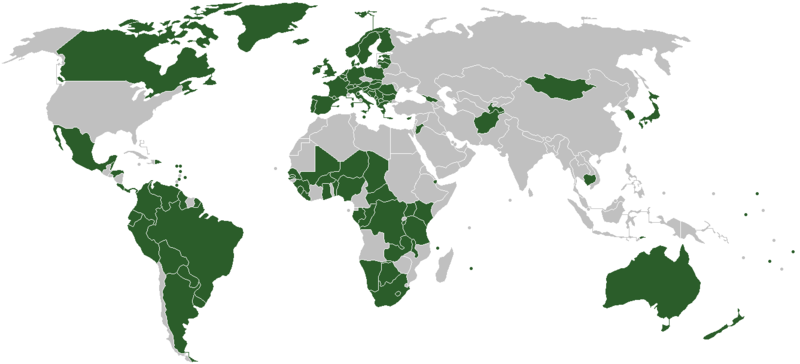
By Conor Godfrey
This past week the International Criminal Court (ICC) added genocide to the charges currently pending against Sudanese President Omar al-Bashir.
This seemingly unenforceable addition has rekindled debate over the relevance of the ICC.
In March 2009, the ICC issued an arrest warrant for Mr. Bashir, to which the Sudanese president retorted, “Dissolve these documents in water and drink them.”
Even though the indictment severely curtailed Mr. Bashir’s travel schedule, few people believe that he will see his day in court
Al-Jazeera’s Riz Khan recently hosted chief ICC prosecutor Luis Moreno-Ocampo to discuss the relevance of the ICC and respond to criticisms that the ICC focuses its investigations on non-Western, specifically African, governments.
One listener from Kenya emailed Riz Khan with the following complaint worth reprinting in full:
“Why is the ICC’s name not changed to African Criminal Court (ACC)?
Apparently, the court only issues arrest warrants for African leaders who committed crimes, while the Western leaders are treated as if their gross human rights violations were not crimes.
Why is Ocampo not issuing an arrest warrant for Bush, Blair, or Israeli leaders?”
Mr. Ocampo’s response: “America is not part of the treaty.”
He could have rephrased that by saying—yes Mr. listener from Kenya, you are absolutely right.
And what about Israel’s three week war in the Gaza Strip?
Well, the ICC does not yet recognize the Palestinian territories as a state, and therefore legal obstacles must be cleared before taking action.
And of the 14 indictments so far, how many have been issued against African leaders? All 14.
Ignoring the complexity of the issue for the moment, you can see how easily opinion leaders in the non-Western world could frame the ICC as a Western weapon. The story practically tells itself.
The funding for the ICC also raises questions about its biases.

Given these gross inequalities, detractors say we should scrap the ICC. Wrong. America should sign up.
If the U.S. fears the ICC could launch politically motivated assaults on U.S. personnel, then they should invest heavily in the ICC process to ensure the court’s independence.
The American exceptionalism that dominated post-cold war thinking must evolve.
By subordinating national power to international norms, the Unites States plays a greater role in shaping those norms.
This will extend U.S. power and protect U.S. interests in the wake of unilateralism’s fall from grace.
The majority of reasons listed for the U.S. refusal to participate in the ICC as a member represents little more than a transparent attempt to remove the U.S. and U.S. personnel from the purview of international Justice.
Moreover, by more than 2 to 1, Americans favor participating in the ICC as a member. (Though admittedly 21% of American’s pleaded ignorance.)
The U.S. entry would revitalize the court and put its detractors on their heels. Many non-signatories would reevaluate their position, and the increased legitimacy of the court would make non-compliers less likely to support those indicted. As long as U.S. personnel, power, and resources remain on the sidelines the listener from Kenya will be right—we might as well call it the ACC.